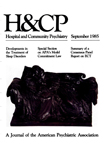A Response to Comments on APA's Model Commitment Law
Abstract
APA's model commitment law was drafted in response to the dominant libertarian approach to civil commitment, which holds that the liberty and privacy interests of a mentally ill individual must be given precedence over all other interests. The author, who was instrumental in drafting APA's model law, responds to questions about the law's provisions raised by the five commentators in this issue. They relate to adequate treatment, practical impact, advocacy, screening and appropriate placement, the fiveday emergency commitment period, exclusion of psychologists from the commitment process, and malpractice litigation as a means of improving mental health services. He identifies what be believes to be limitations in the model law, which underwent several modifications before its approval by APA as Guidelines for the Civil Commitment of Adults.
Access content
To read the fulltext, please use one of the options below to sign in or purchase access.- Personal login
- Institutional Login
- Sign in via OpenAthens
- Register for access
-
Please login/register if you wish to pair your device and check access availability.
Not a subscriber?
PsychiatryOnline subscription options offer access to the DSM-5 library, books, journals, CME, and patient resources. This all-in-one virtual library provides psychiatrists and mental health professionals with key resources for diagnosis, treatment, research, and professional development.
Need more help? PsychiatryOnline Customer Service may be reached by emailing [email protected] or by calling 800-368-5777 (in the U.S.) or 703-907-7322 (outside the U.S.).



